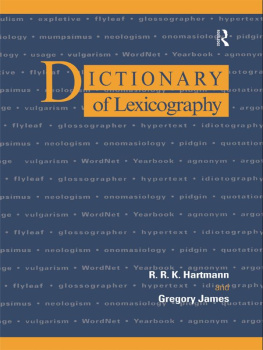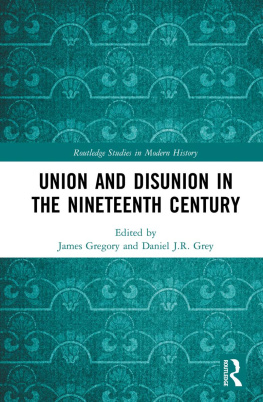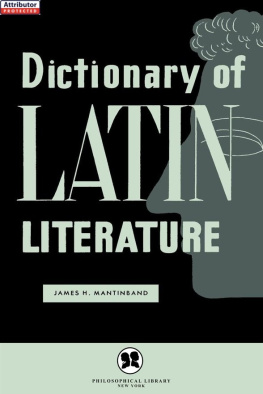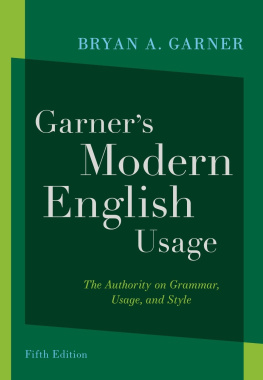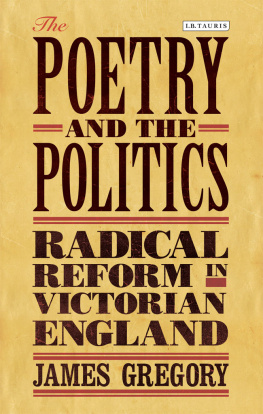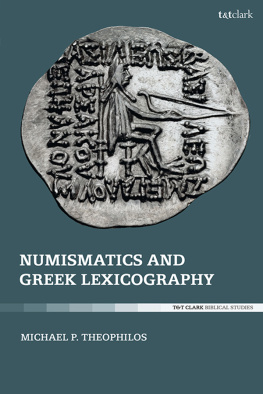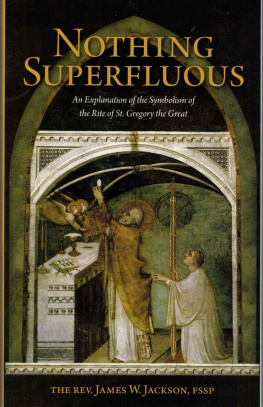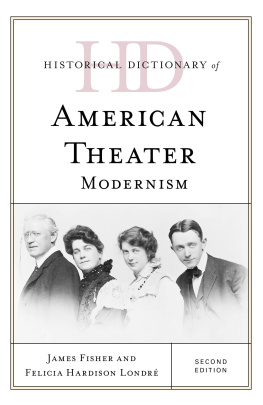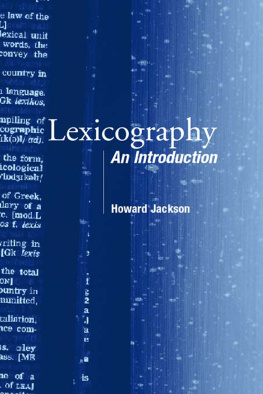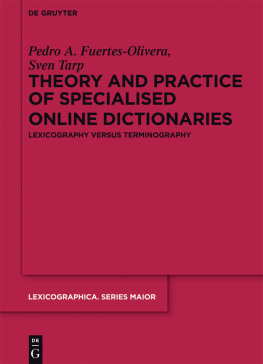James Gregory - Dictionary of Lexicography
Here you can read online James Gregory - Dictionary of Lexicography full text of the book (entire story) in english for free. Download pdf and epub, get meaning, cover and reviews about this ebook. City: London, year: 1998, publisher: Taylor and Francis; Routledge, genre: Home and family. Description of the work, (preface) as well as reviews are available. Best literature library LitArk.com created for fans of good reading and offers a wide selection of genres:
Romance novel
Science fiction
Adventure
Detective
Science
History
Home and family
Prose
Art
Politics
Computer
Non-fiction
Religion
Business
Children
Humor
Choose a favorite category and find really read worthwhile books. Enjoy immersion in the world of imagination, feel the emotions of the characters or learn something new for yourself, make an fascinating discovery.
- Book:Dictionary of Lexicography
- Author:
- Publisher:Taylor and Francis; Routledge
- Genre:
- Year:1998
- City:London
- Rating:4 / 5
- Favourites:Add to favourites
- Your mark:
- 80
- 1
- 2
- 3
- 4
- 5
Dictionary of Lexicography: summary, description and annotation
We offer to read an annotation, description, summary or preface (depends on what the author of the book "Dictionary of Lexicography" wrote himself). If you haven't found the necessary information about the book — write in the comments, we will try to find it.
Dictionary of Lexicography — read online for free the complete book (whole text) full work
Below is the text of the book, divided by pages. System saving the place of the last page read, allows you to conveniently read the book "Dictionary of Lexicography" online for free, without having to search again every time where you left off. Put a bookmark, and you can go to the page where you finished reading at any time.
Font size:
Interval:
Bookmark:
Anyone who has ever handled a dictionary will have wondered how it was put together, where the information has come from, and how and why it can benefit so many of its users. The Dictionary of Lexicography addresses all these issues.
The Dictionary of Lexicography examines both the theoretical and practical aspects of its subject, and how they are related. In the realm of dictionary research the authors highlight the history, criticism, typology, structures and use of dictionaries. They consider the subjects of data-collection and corpus technology, definition-writing and editing, presentation and publishing in relation to dictionary-making. English lexicography is the main focus of the work, but the wide range of lexicographical compilations in other cultures also features.
The Dictionary gives a comprehensive overview of the current state of lexicography and all its possibilities in an interdisciplinary context. The representative literature has been included and an alphabetically arranged appendix lists all bibliographical references given in the more than 2,000 entries, which also provide examples of relevant dictionaries and other reference works.
The authors have specialised in various aspects of the field and have contributed significantly to its astonishing development in recent years. Dr R.R.K.Hartmann is Director of the Dictionary Research Centre at the University of Exeter, and has founded the European Association for Lexicography and pioneered postgraduate training in the field. Dr Gregory James is Director of the Language Centre at the Hong Kong University of Science and Technology, where he has done research into what separates and unites European and Asian lexicography.
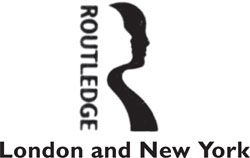
First published 1998
by Routledge
11 New Fetter Lane, London EC4P 4EE
This edition published in the Taylor & Francis e-Library, 2002.
Simultaneously published in the USA and Canada
by Routledge
29 West 35th Street, New York, NY 10001
1998 R.R.K.Hartmann and Gregory James
All rights reserved. No part of this book may be reprinted or reproduced or utilised in any form or by any electronic, mechanical, or other means, now known or hereafter invented, including photocopying and recording, or in any information storage or retrieval system, without permission in writing from the publishers.
British Library Cataloguing in Publication
Data A catalogue record for this book is available from the British Library
Library of Congress Cataloging in Publication
Data Hartmann, R.R.K.
Dictionary of lexicography/R.R.K. Hartmann and Gregory James,
p. cm.
Includes bibliographical references.
ISBN 0-415-14143-5 (hc).ISBN
1. Lexicography-Dictionaries. I. James, Gregory. II. Title.
P327.H37 1998
9734079
413'.028dc21
CIP
ISBN 0-203-01768-4 Master e-book ISBN
ISBN 0-203-17357-0 (Adobe eReader Format)
ISBN 0-415-14143-5 (Print Edition)
We owe a deep debt of gratitude to the very many people who have helped us along our way in the compilation of this dictionary.
The University of Exeter and the Hong Kong University of Science and Technology provided congenial environments within which we were able to work. We benefited greatly from the study leave granted to RRKH, which allowed him an extended period in Hong Kong, sponsored by the British Council and by the Language Centre at HKUST, where we were able to work together face to face. We are extremely fortunate to have had excellent office back-up both at Exeter and HKUST. We should like to thank Cathy Pantry for secretarial assistance at the Dictionary Research Centre at Exeter; and at the Language Centre, HKUST, Ada Fan Shui-fun for secretarial assistance, Candice Poon Wai-yi for executive assistance, and Forward Hui Kam-chun and Terence Chow Chi-wai for technical assistance.
Our professional colleagues have helped us in a variety of ways, and we should like to record our appreciation especially to: (at Exeter) Steven McGill for the database design and transfer, Alan Wakelam for the initial design of the panels, Trevor Learmouth for assistance with library matters and entries, John Wilkins for references for Classics; (at HKUST) John Milton for assistance with computer matters and entries, and the staff of the University Library for general helpfulness.
We should like to thank the postgraduate students at Exeter, especially the 19945 cohort, who helped us in our initial item search; in particular Martin Stark made a great contribution to our wordlist by his very thorough sifting of available sources. Li Lan and her fellow doctoral students helped us greatly in our search for references.
We are grateful to colleagues far and wide for their willingness to answer our queries: especially A. D. de V.Cluver on terminology, Edward Gates on the DSNA, Andrew Taylor on textbooks; others commented very substantially on our text, in particular Adelia Carstens, Amy Chi Man-lai, Turki Diab, Tom McArthur and Daan Prinsloo. We ought to mention, too, the anonymous reviewers of our first draft: their constructive observations on our entries were extremely helpful to us.
We have drawn upon the ideas of many colleagues, both from their published work and from informal personal contacts; we should like to thank, in this regard, Henning Bergenholtz, Rufus Gouws, Colin Yallop and Jacques van Keymeulen, as well as several Visiting Scholars at Exeter.
We appreciate very much the assistance of Rosalind Fergusson, our perspicacious copy-editor, who made significant contributions to the final form of the text. Our editors at Routledge deserve our thanks too, for their care and attention to our work. We should like to thank the many publishers who responded to our requests for catalogues and other information; and the colleagues and students who answered our initial questionnaire, which persuaded us to see our proposed project to fruition.
We hope that all those who made contributions, large and small, to the final product will be for-giving of our sins of commission and omission, for which we alone remain responsible.
Finally, we should like to thank our families for putting up with our prolonged hibernation in our offices, and general absent-mindedness at home while entries were germinating in our heads.
R.R.K.Hartmann Exeter Gregory James Kowloon
A dictionary of lexicography? A dictionary of dictionary-making? Indeed, lexicography is commonly understood in a narrow sense as the theory and practice, or the art and craft (Landau 1984), of dictionary-making, the compilation and preparation of reference texts for publication. However, in the latter half of this century, the importance of a second strand to the discipline, namely the scholarly field of dictionary research, has become increasingly recognised. With the very rapid advances in the technologies and formats of reference materials, particularly as a result of the development of electronic media, the horizons of lexicography have extended, and we are witnessing the emergence of a more global academic domain of reference science in the modern context of the widespread availability of, and ever-increasing needs for rapid access to, all forms of information.
Lexicography, often misconceived as a branch of linguistics, is sui generis, a field whose endeav-ours are informed by the theories and practices of information science, literature, publishing, philosophy, and historical, comparative and applied linguistics. Sister disciplines, such as terminology, lexicology, encyclopedia work, bibliography, terminography, indexing, information technology, librarianship, media studies, translation and teaching, as well as the neighbouring disciplines of history, education and anthropology, provide the wider setting within which lexicographers have defined and developed their field.
Font size:
Interval:
Bookmark:
Similar books «Dictionary of Lexicography»
Look at similar books to Dictionary of Lexicography. We have selected literature similar in name and meaning in the hope of providing readers with more options to find new, interesting, not yet read works.
Discussion, reviews of the book Dictionary of Lexicography and just readers' own opinions. Leave your comments, write what you think about the work, its meaning or the main characters. Specify what exactly you liked and what you didn't like, and why you think so.

